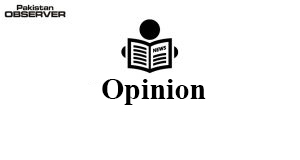Articles and letters may be edited for the purposes of clarity and space. They are published in good faith with a view to enlightening all the stakeholders. However, the contents of these writings may not necessarily match the views of the newspaper.
Building cities for the future
MORE than half of the world’s population lives in cities and as per United Nations Development Program (UNDP), two-thirds of the world population will be urban by 2050.
This rapid urbanization, infrastructure development and expansion of cities have resulted in serious environmental hazards such as Urban Heat Island effect, increase in greenhouse gas emissions, air pollution and noise pollution.
Therefore, SDG 11 which states, ‘Make cities and human settlements inclusive, safe, resilient and sustainable’ holds immense significance in today’s world.
For a city to be well-developed, it also needs to be well maintained. This is possible through policies that encourage sustainability as well as revitalize the creation of lively and dynamic neighbourhoods and people-centric locations – in other words, ‘cities for people.’
Plastic products, especifically polythene bags, choke sewerage systems in cities. While on the other hand, disposal through landfills becomes one of the major reasons for soil pollution and leaching as it takes 1000 years for a plastic bag to decompose in a landfill.
One particular way to promote environmental sustainability is using biodegradable plastic and biodegradable plastic products i.e. jute bags etc.
Biodegradable plastics are made with renewable raw material that can be decomposed by living organisms into water and biomass.
Moreover, a poor public transportation system is also one of the major hurdles in the way of sustainable cities. Excessive reliance on private vehicles is the major cause of air and noise pollution in cities. This issue can be resolved by shifting from public to private transport.
The city administration and local government should introduce sustainable urban transport interventions through bus rapid transit, metro service, etc. Another significant hurdle in the way of sustainable cities is the poor urban planning system.
Developing countries, like Pakistan, Bangladesh, India, etc., do not pay heed to the idea of zoning, population growth rate and geographic mapping that is why the risk of disaster increases.
It is the right time to minimize the chance of disasters by incorporating the idea of green buildings, waste management, renewable energy and green spaces in city planning. In order to face this mounting challenge of plastic pollution, we should use metal straws instead of plastic straws.
Another solution is to use fabric bags in place of commonly used plastic/polythene bags for grocery, shopping or daily use.
Material such as paper, cardboard, glass, steel, compost and other raw material can be disposed of separately in bins to be recycled later on. We should also avoid littering around the city and dispose of waste in bags.
Farzeen Shah
Islamabad
Weakness
in T-20
There is no gainsaying the fact that Babar Azam and Rizwan are the main batters of Pakistan cricket team.
The Pakistan batting largely depends on these two mainstream players. However, in my opinion, they are not suited to play in T-20 format. In the recently held T-20 World Cup matches and against Bangladesh, the fair hardly crossed the 50 digit partnership in the first six overs of power play.
This is the main reason for Pakistan’s collapse in the semi-final against Australia. As such both the batters didn’t show their worth against Bangladesh as well.
So the management of the Cricket Board should devise an alternate strategy to axe them out of T-20 format and restrict them both to test and one-day format only.
In this way, their performance will further flourish to give a robust support to Pakistan batting battery.
SHAUKAT HAYAT BUNERI
Buner
Succeeding tyranny
Another surge in petroleum prices and the succeeding inflation is going to break the back of the impoverished and economically destitute class of the country.
Ascending inflation in a society where forty per cent population living below the poverty line is but a nightmarish reality.
The tremendous contradiction of Pakistan’s politics is that the appealing and carefully crafted rhetorically slogans propounded by political agendas on the eve of elections always proved counterproductive.
From the slogan of bread, cloth and shelter (Roti, Kapra & Makan) to that of New Pakistan what the public received are but the suffering, prosecution and tribulation. The sloganeering, political engineering and charming oratory are but the ploys to entice public support short of delivery and practicality.
The law of diminishing asserts that whenever the demand lessens so do the price of commodities. But here in our country when the rupee gets robust against international currencies, yet the customer prices bulge. From the basic commodities to that of building substances, nothing has glimpsed a price decrease.
The public desires to introspect on the paths their votes are influenced for their political self-centric political agenda and advertising. How long the public would reimburse for the sins of their so-called diplomats and rhetoric. Only a sensible use of votes can put abundance out of suffering on an endurable basis.
INSAF ALI BANGWAR
Kandhkot, Sindh










